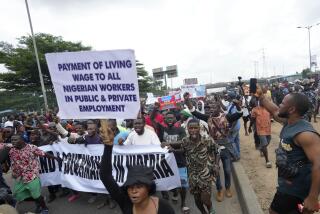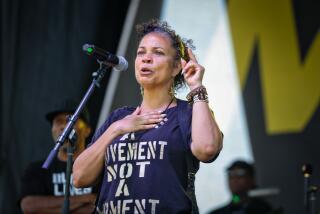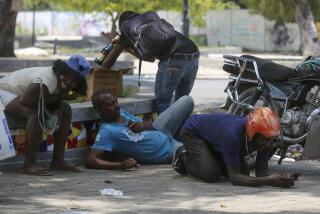In Nigeria, no peace from police officers
- Share via
Reporting from Kaduna, Nigeria — Abdul Wuraola knelt in the dust, pleading for mercy. He’d offended the men with guns. They screamed at him in fury. Nothing he said appeased them. It took one downward thrust of a rifle butt into his skull to fell him.
The gunmen weren’t criminals. They were the police.
His crime: He’d parked carelessly on the roadside in the northern Nigerian city of Kaduna to buy oranges for his breakfast.
Police and security forces in Nigeria routinely engage in random violence that results in hundreds of killings annually, according to human rights groups.
There was the truck driver who drove past a police roadblock in February in the town of Kazaure because of poor brakes. Police dragged him from the vehicle and beat him to death.
Or the student shot and killed that month in Gwarzo when police opened fire during a peaceful protest at a police station claiming that the authorities failed to properly investigate a homicide.
Or the motorcyclist killed in January for getting in the way of a police convoy in Kaduna state. “They got out and shot him,” said lawyer Shehu Sani of the Civil Rights Congress, a nongovernment group.
In a rare admission, last monththen-Police Minister Ibrahim Lame condemned the violence in a meeting with federal police commanders.
“The current rate of crime across the nation, rising cases of extrajudicial killings, human rights violations, robberies, high-profile assassinations and deliberate failure to comply with government directives are testimony to the sheer incapacity or willful defiance of police high command,” Lame said.
“Police is your friend,” reads a poster in the northern city of Kano, but many Nigerians, weary of demands for bribes, see the force as anything but friendly. The ruthless attitude of police and security forces has long been criticized by groups such as Human Rights Watch and Amnesty International.
Shootouts in which bystanders are killed are common. Those who refuse to pay bribes to police at roadblocks are sometimes shot. Torture in police custody is frequent, according to a December Amnesty International report titled “Killing at Will.” It cites numerous cases in which men were arrested, taken to police stations and never seen again. In some cases, families were unofficially told that their relatives were dead.
Police “often claim that the victim was an armed robber killed in a shootout or while trying to escape police custody,” the report says. Noting that the law permits officers to shoot suspects who try to escape or avoid arrest, the report says, “In practice, [this] lets the police get away with murder.”
Abdul Wuraola’s wife, Muibat, crouched in a corner of her house in Kaduna, saying her prayers, her lips moving silently. When she recounted the story of her husband’s death in September, she began to sob in keening, high and mournful sounds.
Police “said they were pursuing someone and accidentally he just got in the way,” she said. He died the next morning in a hospital, never regaining consciousness.
Muibat found a group of students who had seen police striking her husband. “He was pleading with them, ‘I’m just buying oranges for my breakfast,’ ” she said.
Wuraola, a mechanic, had 10 children, half of them with another wife. Muibat, who is unemployed, is left with five children and no way to support them.
Suleiman Ahmed, deputy chairman of the Civil Rights Congress, said that killings at the hands of police are common, but that police usually say they’re accidental. Victims’ families are usually unaware of their legal rights, he said, and “by the time they go to the police . . . the police will just humiliate them.”
Although figures on extrajudicial killings are difficult to estimate, Human Rights Watch listed 7,186 “armed robbers” killed in shootouts with police from 2000 to 2004.
Amnesty International reports that the numbers probably are higher than official figures suggest: Five people a week were reportedly shot by officers at one police station in Abuja, the capital, and one mortuary in southern Nigeria reported the police delivered the bodies of 150 “unknown robbers” in a year. A cemetery in the south also reported receiving two unidentified bodies a week from police.
The Amnesty report breaks down police killings into various categories: people shot at roadblocks, people shot in police operations, those who police said were killed “in a shootout with armed robbers,” those who police said were shot trying to escape, those denied life-saving medical treatment, and those tortured.
“In a country where bribes guarantee safety, those who cannot afford to pay are at risk of being shot or tortured to death by the police,” the report says.
Police are poorly trained and poorly paid, and there is no culture of respect for human rights in the force, the report says. A constable’s salary is about $170 a month.
All Muibat Wuraola wants is justice.
“When I became a widow, the first day I went out, I saw the policemen with their guns. I was crying, crying, crying.
“Whenever I see them, I only feel sadness,” she said. “Sadness all the time.”
More to Read
Sign up for Essential California
The most important California stories and recommendations in your inbox every morning.
You may occasionally receive promotional content from the Los Angeles Times.










